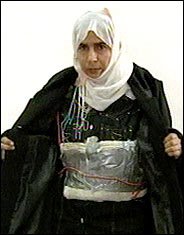In the introduction to the Pevear/Volokhonsky translation of Leo Tolstoy's "Anna Karenina," Mr. Pevear writes:
"Levin also goes through the same religious crisis that Tolstoy went through while he was writing the novel, and reaches the same precarious conversion at the end."
I found the following passage from Part Five of the novel very familiar. Levin is awkwardly attending Confession, a requirement for marriage.
'Christ stands here invisibly and recieves your confession,' he said, pointing to the crucifix. 'Do you believe everything that is taught by the holy apostolic Church?' the priest went on, turning his eyes from Levin's face and folding his hands under his stole.
'I have doubted, I doubt everything,' Levin said, in a voice he himself found unpleasant, and fell silent.
The priest waited a few seconds to see whether he would say anything more, and then, closing his eyes, in a quick, provincial patter with a stress on the "O"s, said:
'Doubts are in the nature of human weakness, but we must pray that God in his mercy will strenghten us. What particular sins do you have?' he added without the slightest pause, as if trying not to waste time.
'My chief sin is doubt. I doubt everything and for the most part live in doubt.'
'Doubts are in the nature of human weakness,' the priest repeated the same words. 'What is it that you doubt predominantly?'
'I doubt everything. I sometimes even doubt the existence of God,' Levin said involuntarily, and was horrified at the impropriety of what he had said. But Levin's words did not seem to make any impression on the priest.
'What doubts can there be of the existence of God?' he hastened to say with a barely perceptible smile.
Levin was silent.
'What doubts can you have of the existence of the Creator, when you behold His creations?' the priest went on in a quick, habitual manner. 'Who adorned the heavenly firmament with lights? Who clothed the earth in its beauty? How can it be without a creator?' he said, glancing questioningly at Levin.
Levin felt that it would be improper to enter into a philosophical debate with a priest, and therefore he said in answer only what had a direct bearing on the question.
'I don't know,' he said.
'You don't know? How can you doubt that God created everything?' the priest said in merry perplexity.
'I don't understand anything,' Levin said, blushing and feeling that his words were stupid and could not help being stupid in such a situation.
'Pray to God and ask Him. Even the holy fathers had doubts and asked God to confirm their faith. The devil has great power, and we mustn't give in to him. Pray to God, ask Him. Pray to God,' he repeated hurriedly.
The priest was silent for a time, as it pondering.
'You are, as I have heard, about to enter into matrimony with the daughter of my parishoner and spiritual son, Prince Shcherbatsky?' he added with a smile. 'A wonderful girl!'
'Yes,' Levin answered, blushing for the priest. 'Why does he need to ask about it at confession?' he thought.
And the priest, as if answering his thought, said to him:
'You are about to enter into matrimony, and it may be that God will reward you with offspring, is it not so? Well, then, what sort of upbringing can you give your little ones, if you don't overcome in yourself the temptation of the devil who is drawing you into unbelief?' he said in a mild reproach. 'If you love your child, then, being a good father, you will not desire only wealth, luxury and honor for him; you will desire his salvation, his spiritual enlightenment with the light of Truth. Is it not so? What answer will you give when an innocent child asks you: "Papa! Who created everything that delights me in this world - the earth, the waters, the sun, the flowers, the grass?" Will you really say to him, "I don't know"? You cannot not know, since the Lord God in His great mercy has revealed it to you. Or else your little one will ask you: "What awaits me in the life beyond the grave?" What will you tell him, if you don't know anything? How will you answer him? Will you leave him to the temptation of the world and the devil? That's not good!' he said and stopped, inclining his head to one side and looking at Levin with meek, kindly eyes.
Levin made no reply, now not because he did not want to get into an argument with a priest, but because no one had ever asked him such questions; and before his little ones asked him such questions, there was still time to think how to answer.
'You are entering upon a time of life,' the priest went on, 'when one must choose a path and keep to it. Pray to God that in His goodness He may help you and have mercy on you,' he concluded. 'May our Lord and God Jesus Christ, through the grace and bounties of His love for mankind, forgive you, child . . .' and, having finished the prayer of absolution, the priest blessed and dismissed him.
On returning home that day, Levin experienced the joyful feeling of having ended his awkward situation and ended it in such a way that he had not needed to lie. Apart from that, he was left with the strange vague recollection that what this kindly and nice old man had said was not at all as stupid as it had seemed to him at first, and that there was something in it that needed to be grasped.
'Not now, of course,' Levin thought, 'but some time later on.' Levin felt more than ever that there was something unclear and impure in his soul, and that with regard to religion he was in the same position that he so clearly saw and disliked in others and for which he reproached his friend Sviyazhsky.
Levin was especially happy that evening, which he spent with his fiancee at Dolly's, and, explaining his excited state to Stepan Arkadyich, said that he was as happy as a dog that had been taught to jump through a hoop and, having finally understood and done what was demanded of it, squeals, wags its tail, and leaps in rapture on to the tabels and windowsills.






